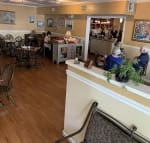Recycling
A tale of two bins
Fred Schorr wrote a simple sentence: “. . . and we’re making money from our recycled trash.” The city and many families are doing much more to recycle than in years past but those two words “making money” started a new conversation. The City of Lighthouse Point has a contract with Waste Management to pay $42.11/ton to haul trash away for residents. The contract also states that the city gets paid at least $60,000 per year for our recycled trash and more if the value of recycled materials increases. Currently, rates are low but should rates improve, recycling will even smarter. Various sources have guessed that 70 percent of the recyclable trash is placed in the proper, city-provided bins. Essentially, everyone is being charged $42.11/ton to haul away that other 30 percent of recyclable trash that if placed in the proper bin, would be hauled away for free.
Reduction or Replacement
What if we reduce the trash we generate by, for example, using canvas grocery bags instead of the single-use plastic ones? Instead of throwing away 100 plastic bags, one will just discard one canvas bag eventually. Similarly, replacing the semi-famous red Solo cup (not recyclable!) with a paper cup or plastic cup made from a plastic other than #6 (see below) can eliminate 100 percent of that one item from going into the landfill bins.
Choosing products that produce landfill trash is bad; while choosing products in recyclable packaging is financially rewarding to all.
San Francisco
San Francisco faces similar trash challenges. With more residents and less space, their trash problem is far greater so they are investing in a zero-landfill campaign called “Zero Waste by 2020.”
The fact is that they, as do we, are trapped in terms of space for landfills. In just a few years, our trash will need to be driven farther and farther north for much more money. San Francisco is just ahead of us in terms of urgency —but our day will come.
San Francisco’s “Zero Waste by 2020” is a significant program but the essence is this:
- Restrict at the source: Plastic bags are illegal for example as are other packaging products. If the city can keep non-recyclable items from entering the trash-stream, that trash won’t be going to the landfill later.
- Composting: Every resident gets a recycling bin, similar to ours, and another one for compostable food and plant matter.
- Recycling: we seem to be doing about the same as them in this category.
- Education: Paid city staff members go door-to-door checking the bins on the street for that day’s trash pickup. If the contents of the landfill, recyclable or compost bins are troublesome, the staff member approaches the homeowner to help them understand what they were doing wrong and guide them toward proper trash-sorting techniques.
A Win Win
Basically, our fair city can save money and in the process, help extend the life of the local landfill. The modern world of trash is actually pretty simple. Lighthouse Point residents just need to know which materials go into which bin or should go elsewhere. (The rest of what happens to all that trash is on the Internet for endless exploration.)
Therefore, the challenge is one of education . . . and motivation.
One soda can doesn’t sound like much. But, one can per day per resident adds up to a ton of aluminum per week citywide or over 50 tons per year.
Recycling takes a modest amount of extra effort. Admittedly, it’s easier to throw everything into one bin and only take one to the curb. Children (husbands and wives) need constant reminding about what is right and wrong to recycle. And it’s easy to forget to bring reusable bags to the grocery story. Publix actually has key chain size versions of their bags to serve as a reminder. Even then, it’s easy to forget.
But what if doing the right thing is easier? What if everyone stopped buying the red Solo cups so Solo begins to offer a cup we can recycle? What if every resident put every possible ton of recyclable waste in the right bin… every week?
Someone will probably say that sounds like a nanny-state or big-government telling us what we can do with our trash. However, getting paid for recycled trash while not paying to remove landfill-bound trash seems worth a bit of effort… not to mention that ticking-time bomb issue of our local Mt. Trashmore and the other negative efforts on the world’s environments.
Changes are coming faster than most people may realize. LED lights are advancing fast (Many are still trying to use up incandescent lights and don’t even know about CFLs). As of the time of this writing, California Governor Jerry Brown is telling the media he will sign a measure to outlaw all single-use plastic bags in his state – mostly because 37 counties already outlaw the bags and the inconsistency is difficult for vendors and patrons.
The city’s contract for trash hauling will change in coming years as will technologies and materials in packaging production and recycling capabilities. Our roles as citizens of the city and the world will need to adjust with these changes but the fundamentals of reduced use of landfill-bound materials, proper elimination of hazardous items, and recycling of all other material will surely be consistent.
Adventures in composting
“When my husband approached me about composting, I gently reminded him that I am a city girl. Composting just sounds gross, smelly and difficult. Basically, I thought he was nuts. But, he was growing a vegetable garden and needed better dirt. I have to admit, the idea of composting was more appealing to me than buying dirt—which just seemed silly. Turns out, good soil isn’t so cheap. I started small. First, I put an old Folgers coffee tub in my sink. I threw in cucumber peels, peach pits, watermelon rind—you get the idea. I never threw in any protein. The protein is what can really stink. Second, I put an old Lego container just outside the patio door. When my Folgers tub filled up, I emptied into the Lego container. I cook a lot, so I made that trip once or twice a day. Here is really the beauty of my system. I had my husband empty the Lego container into an old trash can he had retrofitted to be a composting bin. He sawed off the bottom of an old trash can and also cut out a little flap at the bottom. Then he buried it about nine inches deep in the back corner in the yard (out of sight.) This way, he could dump new organic material into the top of the bin. And about three weeks later, he could scoop the new compost out of the bottom. Genius. Once we realized, we were sticking to this system, we actually invested in a real compost tumbler. The tumbler is basically a garbage can on its side that you can rotate, so you can mix up the contents and dump some out when you need it. You can also upgrade from an old Folgers tub to a cute compost bucket. There are tons of adorable ones online. Personally, I still use the old bucket technique. While I have become a huge fan of composting, I would still rather go shoe shopping than buy composting supplies. Composting is nature’s way of recycling. At first, it can seem like a daunting task—not to mention sort of gross. But once you get into the swing of it, you’ll never go back.”
—Susan Rosser
HAZARDOUS WASTE
Effective October 1, 2014, Lighthouse Point residents may utilize the Broward County Household Hazardous Waste (HHW) collection site at 2780 N. Powerline Road, Pompano Beach, FL. Electronic components are also accepted. That facility is open most every Saturday from 8:00am. to 4:00pm. There is no charge for residents to drop-off items. You will need to provide a driver’s license or other proof of residency. The City will no longer conduct the semi-annual hazardous waste pickup events.
THESE ITEMS should not be added to regular trash and ARE ACCEPTED AT THE RESIDENTIAL DROP-OFF STATION
Electronics including TVs, computers, monitors, keyboards, printers, copiers, and DVD and VCR Players.
Aerosol products
Ammonia
Ammunition
Antifreeze
Auto fluids
Auto batteries
Boat batteries
Boat fluids
Charcoal starter
Compact fluorescent lamps
Drain cleaners
Fertilizer
Fire extinguishers
Fireworks
Flares
Fluorescent tubes
Gasoline
Herbicides
Household cleansers
Insecticide
Kerosene
Lawn chemicals
Lighter fluid
Mercury thermometers
Motor oil
Nail polish remover
Paint
Pesticides
Photo chemicals
Pool chemicals
Propane tanks
Rechargeable batteries
Rust remover
Solvents
Spot remover
Tires (limit 4)
Turpentine
Weed killer
Wood stain
Wood stripper
Containers may not exceed five gallons; limit 25 gallons per visit. For more information, call Public Works Department at 954-946-7386.







